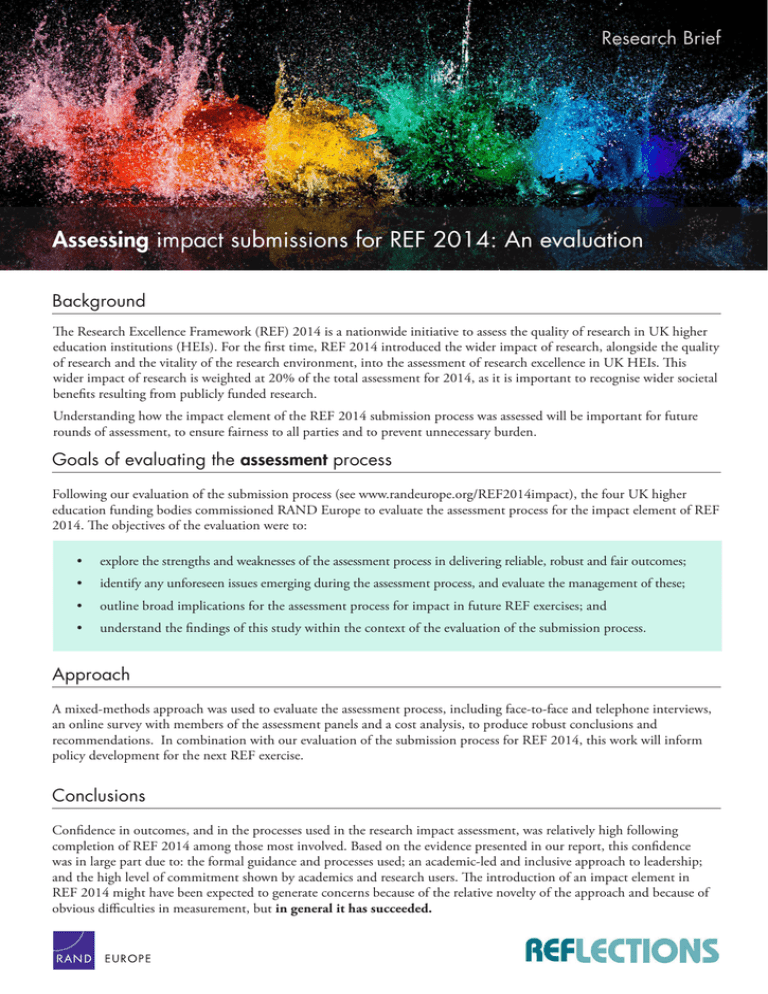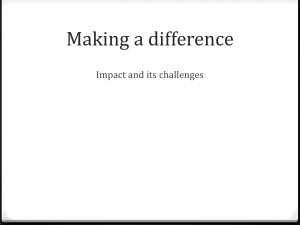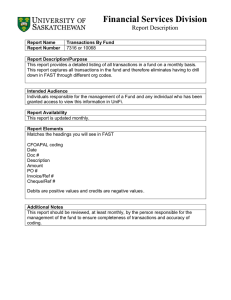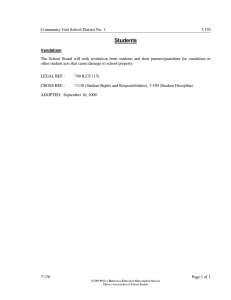Assessing impact submissions for REF 2014: An evaluation Research Brief Background
advertisement

Research Brief Assessing impact submissions for REF 2014: An evaluation Background The Research Excellence Framework (REF) 2014 is a nationwide initiative to assess the quality of research in UK higher education institutions (HEIs). For the first time, REF 2014 introduced the wider impact of research, alongside the quality of research and the vitality of the research environment, into the assessment of research excellence in UK HEIs. This wider impact of research is weighted at 20% of the total assessment for 2014, as it is important to recognise wider societal benefits resulting from publicly funded research. Understanding how the impact element of the REF 2014 submission process was assessed will be important for future rounds of assessment, to ensure fairness to all parties and to prevent unnecessary burden. Goals of evaluating the assessment process Following our evaluation of the submission process (see www.randeurope.org/REF2014impact), the four UK higher education funding bodies commissioned RAND Europe to evaluate the assessment process for the impact element of REF 2014. The objectives of the evaluation were to: • explore the strengths and weaknesses of the assessment process in delivering reliable, robust and fair outcomes; • identify any unforeseen issues emerging during the assessment process, and evaluate the management of these; • outline broad implications for the assessment process for impact in future REF exercises; and • understand the findings of this study within the context of the evaluation of the submission process. Approach A mixed-methods approach was used to evaluate the assessment process, including face-to-face and telephone interviews, an online survey with members of the assessment panels and a cost analysis, to produce robust conclusions and recommendations. In combination with our evaluation of the submission process for REF 2014, this work will inform policy development for the next REF exercise. Conclusions Confidence in outcomes, and in the processes used in the research impact assessment, was relatively high following completion of REF 2014 among those most involved. Based on the evidence presented in our report, this confidence was in large part due to: the formal guidance and processes used; an academic-led and inclusive approach to leadership; and the high level of commitment shown by academics and research users. The introduction of an impact element in REF 2014 might have been expected to generate concerns because of the relative novelty of the approach and because of obvious difficulties in measurement, but in general it has succeeded. There are a number of incremental improvements which could be made to the process. These include: access for panellists to underpinning research and corroborating evidence; potential use of closed questions detailing eligibility; the stringency with which to apply the format; and clearer guidance to HEIs and panellists (e.g. on how to present eligibility information within the case studies, and whether impacts need to demonstrate both reach and significance). In addition, we have flagged some areas for further consultation. These include: revisiting how to manage variations in the way the process was conducted; how to avoid the risk of unsubstantiated and false claims being made; how to clarify the processes for assessing different kinds of impact; and how best to capture the information pertaining to the wider HEI environment for nurturing and developing impact. By a large majority, panellists felt the process enabled them to assess impact in a fair, reliable and robust way “I’ve been struck all the way through by…the efforts being made on the structure of the exercise to ensure that there was a fair and proper assessment.” Recruitment of panel members Allocation of case studies & templates Calibration Review of documents & individual scoring Moderation, rescoring & validation 2011−2014 Early 2014 April 2014 Meeting 1 May 2014 Meeting 2 July 2014 Auditing Areas for further thought and improvement Bringing together different perspectives of academics and research users was seen to be successful and valuable “It was a stroke of genius to get people together to get that consensus generated.” • • Through involvement, research users built useful networks, but the burden of involvement was a significant challenge. Engagement by academics in the process offered benefits for academic careers and institutions. “There is much to commend [in the process] although there are improvements to be made and much to be learnt.” • • • Panellists felt they were able to differentiate between submissions in more detail than the scoring process allowed them to express. There was variation in the way the process was conducted. There were particular challenges in assessing the impact templates. This research brief describes work documented in Assessing impact submissions for REF 2014: An evaluation, by Catriona Manville, Susan Guthrie, Marie-Louise Henham, Bryn Garrod, Sonia Sousa, Anne Kirtley, Sophie Castle-Clarke and Tom Ling, RR-1032-HEFCE, 2015 (available at www.rand.org/t/RR1032). The research was conducted by RAND Europe and funded by the Higher Education Funding Council for England, the Higher Education Funding Council for Wales, the Scottish Funding Council and the Department for Employment and Learning, Northern Ireland. manville@rand.org RAND Europe is a not-for-profit research institute whose mission is to help improve policy and decisionmaking through research and analysis. RAND’s publications do not necessarily reflect the opinions of its research clients and sponsors. RAND® is a registered trademark. © Copyright HEFCE 2015 Limited Print and Electronic Distribution Rights: This document and trademark(s) therein are protected by law. This document is provided for noncommercial use only. Unauthorised posting of this publication online is prohibited. Permission is required from the copyright holder to reproduce, or reuse in another form, this document for commercial use. RB-9834-HEFCE WESTBROOK CENTRE MILTON ROAD CAMBRIDGE CB4 1YG UNITED KINGDOM TEL +44.1223.353.329 FAX +44.1223.358.845 RUE DE LA LOI, 82 1040 BRUSSELS BELGIUM TEL +32.2.669.2400 www.randeurope.org



